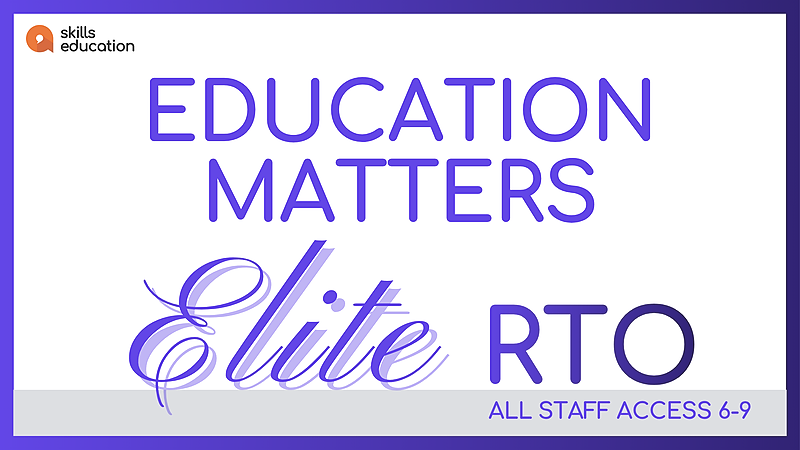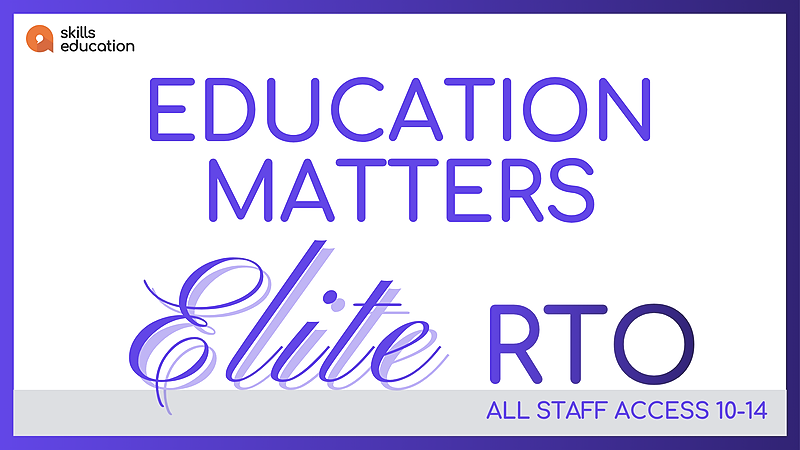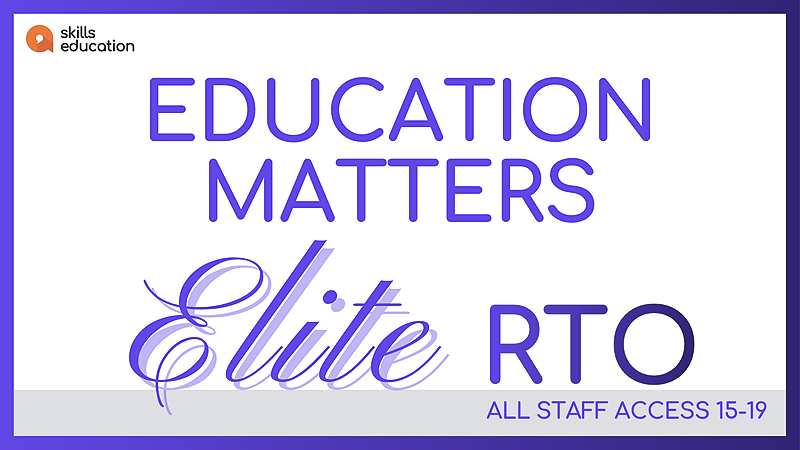PD MAX for 2026
See more on the PD MAX 2026 page

When you purchase registration for a Skills Education session (or it is purchased for you), you'll also receive our updates. Signing up for a Skills Education session means you agree to the Terms and Conditions under which our services are provided
Here's what we offer to support your ongoing professional learning and for RTOs, growth in staff knowledge, and quality in operations
Unpack how small shifts in structure, language, and task design can reduce cognitive load, promote clarity, and amplify the strengths of neurodiverse learners
REGISTER NOW →Let's acknowledge the disruption caused by GenAI and turn our focus to legitimate use of AI in the ‘classroom’. Unpack options and ethical considerations in adoption/deployment of artificial intelligence in the learning environment
REGISTER NOW →Great learning sticks when it feels relevant, human, and emotionally engaging. Discover practical ways to weave stories into explanations, case studies, assessment tasks, and group activities, enhancing motivation and connection without needing a major redesign.
REGISTER NOW →Can AI help us design assessments that feel more relevant, more accessible, and still uphold quality and integrity? See what the research says. Session for members
REGISTER NOW →Beyond Business as Usual: Productivity Strategies for RTOs - Session 1 of 4. Hear about real-world examples where RTOs have successfully achieved diversification.
Session for members (RPL Matters and Education Matters) - open for "pay-to-attend" registration for non-members
REGISTER NOW →Unpack holistic considerations for support and how to ensure students are given accurate information prior to enrolment about the skills and competencies required to succeed in the course
REGISTER NOW →TAE Trivia is regular feature on the Skills Education calendar, and overwhelmingly folks tell us they enjoy the sessions which combine VET PD with fun, friendly competition. These are free-to-enter events with the chance to win one of a selection of prizes. (Prizes are for the top three scorers).
REGISTER NOW →This session will give the starting foundations for how to address requirements in the 2025 Standards for RTOs and tips to better align RTO practices, policies and procedures so that all students feel welcomed and included
REGISTER NOW →Find out how to use tools like Copilot in ethical ways and how to support your students to do the same
REGISTER NOW →Look at AI-driven LLN tools and demystify their benefits, boundaries, and biases when it comes to offering ethical foundation skills support
REGISTER NOW →Stepping forward with RPL in 2026! There are a number of reasons for why RPL practice has slipped over the years. And there are even more reasons why it should be on your RTO's agenda. No cost to register
REGISTER NOW →Understand the differences in methods on the online learning spectrum to design efficient, effective learning experiences
REGISTER NOW →Get frameworks that help trainers recognise mental health signals, build psychological safety, and weave wellbeing into everyday teaching
REGISTER NOW →Beyond Business as Usual: Productivity Strategies for RTOs - Session 2 of 4. Uncover how to safe-guard operations via deeper partnerships with industry.
Session for members (RPL Matters and Education Matters) - open for "pay-to-attend" registration for non-members
REGISTER NOW →Learn more about how your industry is using AI and automation, and investigate strategies for remaining industry current
REGISTER NOW →TAE Trivia is regular feature on the Skills Education calendar, and overwhelmingly folks tell us they enjoy the sessions which combine VET PD with fun, friendly competition. These are free-to-enter events with the chance to win one of a selection of prizes. (Prizes are for the top three scorers).
REGISTER NOW →Support Principles of Assessment, Reliability - get tips from this session which unpacks how to write useful, reliable benchmarks that will be used!
REGISTER NOW →Session 1/3: Unpack the meaning of validation & the various activities that comprise validation of the RTO’s assessment tools, system, practices
REGISTER NOW →Get tools for designing tasks that offer authentic choice and autonomy, helping educators shift from “teaching content” to “facilitating growth”
REGISTER NOW →Strategies to foster a supportive and inclusive learning environment with a focus on unnoticed or misunderstood barriers
REGISTER NOW →Dive into Cognitive Media Psychology to understand the profound impact of media and social media on the learner's attention, perception, and memory
REGISTER NOW →Session 2/3: Unpack the requirements of Outcome Standard 1.3 with a view to identifying the types of activities RTOs can undertake, including ways an RTO can evidence meeting the required outcomes
REGISTER NOW →Beyond Business as Usual: Productivity Strategies for RTOs - Session 3 of 4. Hear about real-world examples where RTOs have successfully shifted their messaging to package their training as an essential solution.
Session for members (RPL Matters and Education Matters) - open for "pay-to-attend" registration for non-members
REGISTER NOW →Get essential insights into creating and implementing Learning Support Plans to effectively support diverse learners and apply reasonable adjustments
REGISTER NOW →Session 3/3: Get tips for undertaking validation of assessment judgements, including how to apply the stipulations from the Credential Policy that are linked to personnel requirements
REGISTER NOW →Session 1/4: Workshop an answer to the question “what is learning?” with a view to understanding how it works, and what practices of our own may be potentially blocking the process for learners. Also discuss the necessary pre-requisites to setting up a successful learning environment
REGISTER NOW →Learn to create diagnostic and formative tools that measure capability without marginalising the learner behind the data
REGISTER NOW →Social media has an addictive pull for sure. Find out how to create social media inspired learning environments (SMILEs) for Gen Z without actually using social media sites
REGISTER NOW →Beyond Business as Usual: Productivity Strategies for RTOs - Session 4 of 4. Our panel talks and gives insight to what's been tried, what's worked and what hasn't.
90 minute session for members (RPL Matters and Education Matters) - open for "pay-to-attend" registration for non-members
REGISTER NOW →Session 2/4: Unpack what the hidden curriculum is and the implicit expectations it brings for adult learners. Discover why engagement is not always a matter of interest
REGISTER NOW →Get actionable training strategies that foster persistence and belief in one’s own ability to learn
REGISTER NOW →Get an introduction to Gilly Salmon’s tried and tested 5 Stages of eFacilitation, a model containing the essential steps for successfully facilitating engaging online training
REGISTER NOW →Get a practical introduction to digital credentials: what they are, how they work, and how they can be used to support learner engagement and progression
REGISTER NOW →Session 3/4: More than ever, people must learn critical thinking and information analysis skills. Build skills for adaptability, resilience, and a capacity for lifelong learning
REGISTER NOW →Effectively navigate VET. Start and/or continue your role in VET with confidence. Learn the essentials of our sector in this session
REGISTER NOW →“Give a man a fish, he’ll eat for a day; teach him how to fish and he’ll eat forever” - Find out how to strike the balance of imparting necessary information for learning and imparting the skills to build lifelong learners
REGISTER NOW →This session doesn’t just cover wellbeing in the 2025 Standards for RTOs, it bridges the gap between compliance and being ethical, moral and human
REGISTER NOW →Session 4/4: Get insight to the potential of learner-centred approaches and collaborative opportunities offered by technology. Round out the series with reflection on embedding sustainable education principles and practices
REGISTER NOW →Unpack key role requirements for an RTO Administrator. Advance and/or confirm current understanding of this pivotal position within an RTO
REGISTER NOW →Successful RTOs rely on their trainers being able to effectively use and navigate the RTO's digital ecosystem. Not only to do their jobs, but to maximise student learning and engagement
REGISTER NOW →Learn frameworks for working with Indigenous and CALD learners, balancing respect for cultural identity with effective skill development
REGISTER NOW →Time to go beyond basic 'Zoom calls' and ‘Teams meetings’ for training. Learn the best-practice principles of online facilitation so all students can be engaged and no student is left behind
REGISTER NOW →Get a refresher on the unique challenges and motivations of adult learners and reflect on the role you play in delivering learning in a changing world with changing needs
REGISTER NOW →This thought-provoking session challenges RTOs to reimagine LLN as a strategic capability that enhances quality, learner outcomes, and workforce readiness
REGISTER NOW →Digital literacy is a critical skill for success in work, life, and accessing services today and in the future. Find out practical ways you can help build these necessary skills in students
REGISTER NOW →How high is the risk to your RTO posed by the assessment tools it uses? Find out what a validator or auditor will look for and how to confirm your tools include these vital elements.
REGISTER NOW →To effectively work in the VET sector and ensure students are equipped with vital, future-workforce-ready skills, trainers must possess and be able to pass on essential digital literacy
REGISTER NOW →Learn how to scaffold learning tasks that build confidence with devices, platforms, and online communication while reinforcing foundation skills
REGISTER NOW →
Join the member-directed Australian learning community focused on sharing knowledge and upskilling in matters linked to Recognition of Prior Learning (RPL). Take out an annual membership to be a part of the Live Meet Ups and to access the Resource House
$110 per person per annum
JOIN NOW →Ultimate access to Skills Education PD. An annual membership subscription to ELITE gives you access to the Education Matters Learning and Resources hub, free RPL Matters membership, all recordings in the PD Library plus automatic registration to all live webinars for the calendar year - no more to pay!
$900 per person per annum
JOIN NOW →Take out an annual membership subscription to explore a wealth of information, resources and tools on matters about education, training and learning. Join the live sessions
$350 per person per annum
JOIN NOW →"Let's talk about..." sessions give a chance to share information, ask questions and get answers to topical issues
Start your Education Matters membership today to join our Professional Learning Community discussions
SEE WHAT WE'LL TALK ABOUT IN 2026 →The online workshops in this series are for members of our professional learning communities, RPL Matters and Education Matters.
Non-members can registers as "pay to attend"
MORE ABOUT THE SERIES AND TO REGISTER →
Elite Education Matters Membership for 6-9 Staff from your RTO. No more to pay for webinars, PD Library, Professional Learning Communities
$4,250 / year

Elite Education Matters Membership for 10-14 Staff from your RTO. No more to pay for webinars, PD Library, Professional Learning Communities
$6,950 / year

Elite Education Matters Membership for 15-19 Staff from your RTO. No more to pay for webinars, PD Library, Professional Learning Communities
$8,950 / year

Get one-on-one mentoring through the program which will teach you how to create candidate-centred, assessor-led tools. Earn a microcredential with successful demonstration of acquired skills. Inclusive of video-based learning, eBooks, extension resources, formative quizzes, and for alumni, ongoing membership to RPL Matters
$1,950 per person with assessment included
ENROL NOW →This program does not involve having to create the RPL kits but it will provide an opportunity to deepen your knowledge about candidate-centred RPL processes and toolkits. Inclusive of video-based learning, eBooks, extension resources, formative quizzes, and for alumni, ongoing membership to RPL Matters
$1,250 per person for advanced PD learning
ENROL NOW →With mentor support, learn more about how to effectively cluster units of competency to create assessment tools that offer a non-repetitive, holistic option.
$1,050 per person - no assessment, just advanced professional development
ENROL NOW →Be introduced to the Third Wave Strategy Framework and learn how to use it to boost critical strategic thinking skills.
Work through the self-paced video content to get a fresh way to consider organisational planning and change and to facilitate critical strategic thinking.
$790 per person for the full program
ENROL NOW →Explore contemporary strategy models focused on stakeholder alignment, systems thinking and adaptive renewal. Examine the cognitive and cultural factors shaping strategic judgement and get ideas for how to apply in your own organisational context. Get the confidence to start with strategic thinking!
$395 per person
ENROL NOW →Build on the knowledge from the 'Strategic Thinking Fundamentals' and learn how to apply innovation and align daily practice with long-term strategic purpose in complex, evolving environments
$395 per person
ENROL NOW →Automatic annual access to content for PD Library Pass, and PRO and Elite Education Matters subscribers
Visit our updates page for convenient access to released documents in one place
Hassle-free compliance support